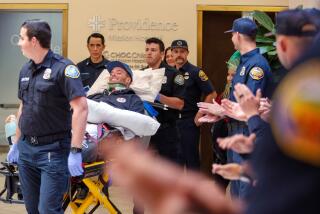Rookie Firefighters Show Their Stuff After Graduation
- Share via
Seven young men concluded nearly two months of intensive firefighter training with graduation ceremonies Saturday at Station 2 of the Torrance Fire Department.
As family, friends and department brass looked on, the graduates demonstrated some of their newly acquired skills. Sirens whooped as a fire truck pulled up to the four-story training tower and projected a ladder to the upper windows. Two helmeted, slicker-clad firefighters scurried up the ladder, raced through the tower, emerged on the opposite side and rappelled to the ground.
In a fire they could be called upon to descend a ladder or rappel down the side of a burning building while bearing the weight of an unconscious or panic-stricken person.
At the same time, other new firefighters showed how they would rescue a victim from a burning car. Hoses were unreeled from a truck and the imaginary fire doused. The car roof was removed with powerful metal cutters, its doors pried open with the “jaws of life,” and the dummy victim rescued.
These dramatic demonstrations, however, represent only a small part of the skills and knowledge that today’s firefighters must master before they are considered prepared for the demands and pressures of the job, according to training officer Capt. Robert Hatton.
Even after seven weeks of study and practical training and hours of study at home, the graduates now face an additional 10 months and one week of higher-intensity training.
For the past seven weeks the new graduates had been isolated from the rest of the department, except for their training officers. Chief Scott Adams said that during the first seven weeks of training they discourage contacts with the troops. “They have to earn their way into the troops,” he said.
At their new assignments, the graduates will be evaluated on their attitudes, their mastery of firefighting skills and their willingness to become part of a team, Adams said. “We have made seven guys into a team. Now they will be going through that process again. Most of the people will be strangers. They will have an opportunity to become part of that (new) team,” Adams said.
Training officer Capt. Bill Peterson said that up to now the new firefighters have been spending eight hours daily with their classmates; they will now live with their station mates for 56 hours a week. During that time they will work, study, eat, clean and play together.
“The department literally becomes your first family, almost, because of the working conditions. Even at home, you are out in the yard (part of the time), while your wife is in the house,” Peterson said.
Some of the veteran members of the department will test the mettle of new firefighters by subjecting them to a mild form of hazing. Although this hazing is not endorsed by the department, it is recognized as a traditional part of the firefighter’s life.
Peterson said: “We are aware of that life style. For the first six months they may get a bucket of water dumped on them. You have to have a sense of humor. Most of the guys (the veteran firefighters) are very supportive. These guys are going to be living with you. We have a very close group of very high-caliber people.”
Peterson said: “They are on probation for 10 months and one week. At any time during that period they can be removed for various reasons. We usually find out during the seven-week period if they have what it takes. We have had a few who got on the floor and we found out they couldn’t take the stress.”
More to Read
Sign up for Essential California
The most important California stories and recommendations in your inbox every morning.
You may occasionally receive promotional content from the Los Angeles Times.













